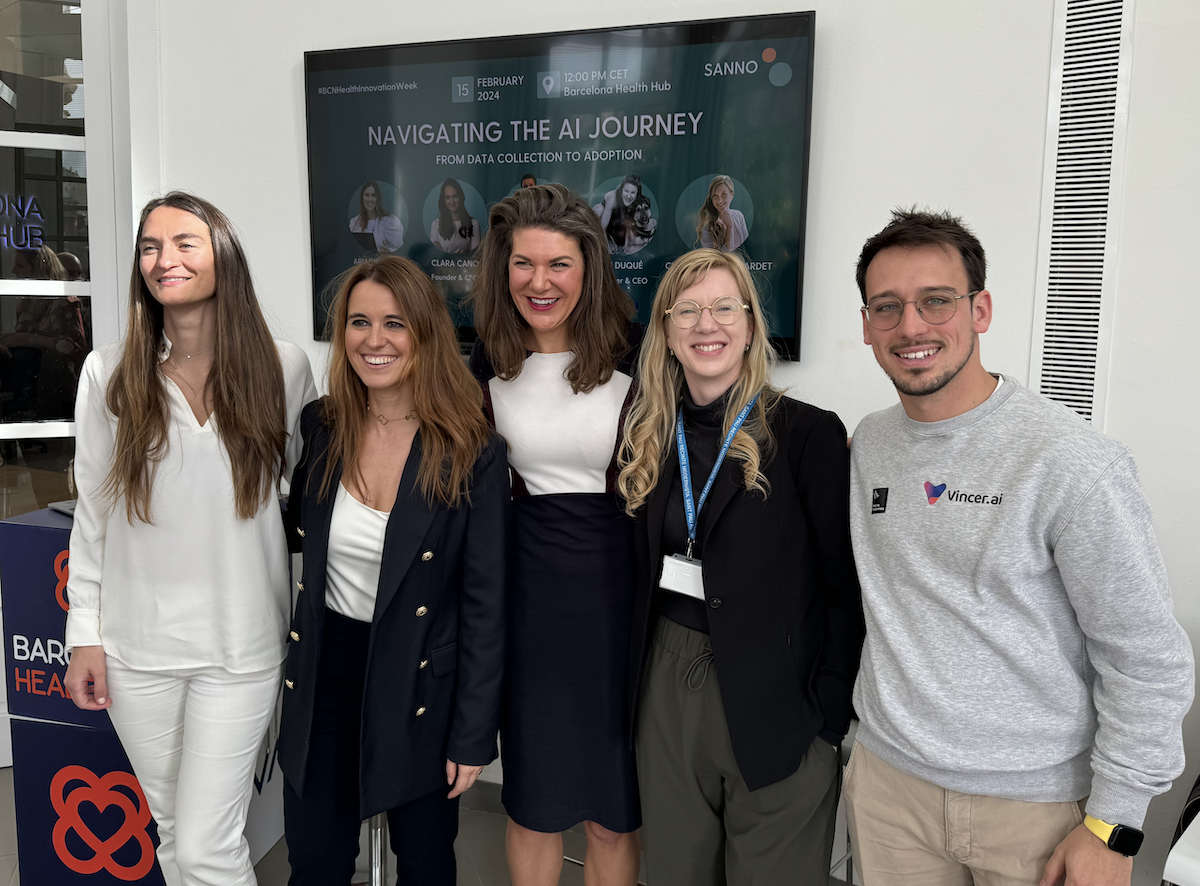Engage
Developing AI products in healthcare: lessons from Barcelona

On 15 February 2024, Barcelona Health Hub hosted a panel to discuss AI in healthcare: it was a packed event with over 40 attending, demonstrating the strong local interest in developing health-related AI products.
The focus was on common themes and challenges in adopting AI for healthcare, smoothly facilitated by Ariadna Masó of Sanno who managed to steer conversations into a discussion by the panelists, rather than getting the vibe stuck in a clunky one-panel-member-answers-a-question-at-a-time rhythm. Masó fostered a discussion amongst panelists who each brought their extensive experience, industry knowledge, and current activities to the conversation without them turning their answers into a sales pitch for their own business, either.

Based on the discussions and audience questions, three themes were raised more than most:
- Use cases
- Ethics and regulation
- Data governance as a specialisation
Use cases
The theme of use cases for AI was raised throughout the discussion and was a key push, particularly from Ashley Duqué of Almma. "You need to think first about what does your product aim to solve, and it is not always AI that will solve that," Duqué cautioned. She encouraged people to think just as much about backend processes or opportunities for AI use cases as patient-facing products. (One example that struck me was in a discussion amongst panelists about the different data classification systems used in health, with standards like SNOMED CT, ICD-10, and so on all having different ways to code a disease or illness. Using AI to translate a dataset from one data model standard into another is an excellent use case.)
Christine Doig-Cardet from IOMED encouraged that during use case research, in addition to direct use case populations, speaking with experts about the populations they serve would help understand needs, but when doing so Doig-Cardet suggested to "make sure there is diversity in the experts you are speaking to". Panelists also spoke of the biases that might start with healthcare professionals offering different standards of care to different populations, this in turn is then reflected in the data that is collected about those populations, so speaking to experts from the same background could increase the data biases and narrow the value of the data even further.
Ethics and regulation
While ensuring engagement with direct user populations and a diversity of experts was one mechanism to address biases and inequality in the data used to make AI, panelists also spoke of the importance of understanding potential biases in any datasets being ingested.
Transparency was highlighted as one solution: the level of available data and its potential for bias is a systemic issue that will take a range of strategies and efforts to solve. In the meantime, being transparent about the limitations of any data being used and creating mechanisms to source or address those limitations in the overall data governance plan is essential.
Panelists referred to a car analogy frequently throughout the session. In regards to addressing ethics, biases and regulation, for example, you don't need to understand how a car engine works in order to get a drivers license, but there is some transparency around limitations (such as maximum speed, optimal tyre pressure, that drivers need to know about their cars) in the same way that there could be transparency about the shortcomings of any datasets being used. And as Pol Solà from Vincer.ai pointed out, the engine in a car needs to be certified: in the same way, future regulations could certify datasets as being fit-for-purpose if they have addressed biases, for example.
Data governance as a specialisation
Clara Cano, of Unlimited Thinking, said that for many AI startups working in healthcare, one of the biggest challenges is the lack of available data. In Spain, this is even more complex as data collection and management is managed at the autonomous community level which means there are few datasets for whole of population across the country, multiple data formats used by each authority, and so on.
This creates challenges across the data journey for AI product builders: sourcing data, ensuring compliance with data protection regulations, standardising data formats, validating data, and understanding potential biases and limitations in datasets, and so on. While data governance is an essential prerequisite for enabling AI product development, as one panelist observed, to date, when health providers meet to discuss potential AI use cases, the data governance lead is rarely in the room.
Learnings for Platformable
Given our focus on supporting health organisations with data governance frameworks, including through our online training course, and our work on data policy and open health ecosystem mapping, I was curious to meet local health organisations and to hear about how data governance is being matured to ensure readiness for AI. As panelists shared, there is still quite a separation between data governance and AI product development. It is an area we will seek to address more in our work, alongside building out AI governance models that align with emerging regulations such as those that are expected as part of the European Health Data Space, and any health-specific interpretations in the recent European AI Act. Spain is also working to become an AI hub, so understanding the policy levers at the national level and how Spain is addressing health data fragmentation since our last study into the national health data policy context is needed work we will be doing other the coming months.
As Doig-Cardet pointed out, data governance is a fairly new specialisation (even if, as audience member Yuri Justi noted, the number of people employed in the field has substantially increased since COVID). Today, data governance leads often work in isolation outside of a more organisational-level data culture.
For our work, we see the opportunities to share our data governance model and approach more widely. Our Open Health Ecosystem Principal Eric Rochman often points out: our data governance framework goes beyond the technical aspects of managing data across the data journey and instead positions data governance in a broader context of ecosystem stakeholders and data users, facilitating a trust framework between data sharers and data users, and ensuring that value can be generated for all participants in an ecosystem. While I am hesitant at times on leaping into AI too quickly without an AI governance framework in place which addresses ethical and other risks, I did realise from the discussions that eagerness to advance on AI opportunities could be the gateway needed to encourage more comprehensive and considered data governance approaches within each organisation as a prerequisite to enabling them to work on AI. It is a point I have argued in recent keynotes, but in the past, I have seen it as a cautionary tale ("you need to work on your data governance first!") rather than as an opportunity to start a conversation ("You want to use AI? Cool! Lets look at your data governance approach...")
As a new member of the Barcelona Health Hub I was impressed with the turnout, level of audience engagement, and expertise of panelists and the facilitator for this event. For any health startup, I recommend finding your equivalent networking association, becoming a member and attending events as a means of entering the local ecosystem and hearing about the current challenges organisations are facing, and the opportunities to understand where you can add value. For Barcelona Health Hub members reading this article (and others who have stumbled across this), please subscribe to our newsletter (use the footer at the bottom of this page) to keep up with the rest of our open health ecosystem content (for example, we have some in-depth pieces on AI in healthcare coming out over the next two weeks) ...and say hello at the next event!

Mark Boyd
DIRECTORmark@platformable.com